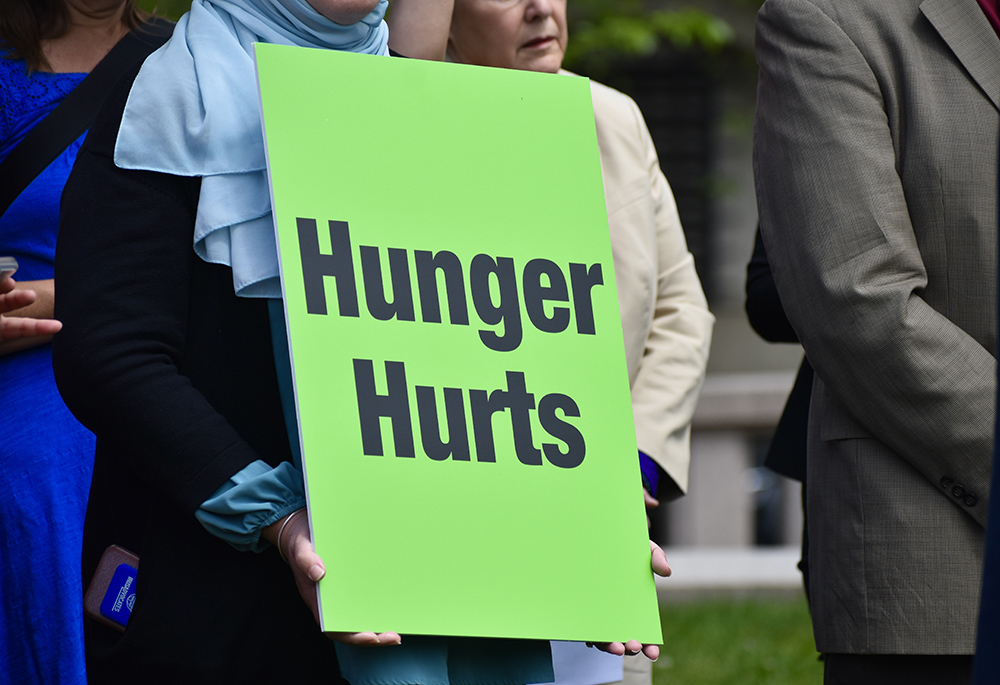
1 A participant at the "Care Not Cuts" rally holds a sign reading "Hunger hurts" April 26 in Washington. (Courtesy of Network Lobby/Catherine Gillette)
The other day, as part of my ministry at Network Lobby, I spoke with the nurse and the executive director of a senior center in Pennsylvania. I had reached out to find out about experiences of food insecurity that their members might be facing, hoping that they would share stories of how seniors on limited incomes need the support of programs like the Supplemental Nutrition Assistance Program, or SNAP, that the Network Thriving Communities campaign is trying to protect in the ongoing budget and debt ceiling negotiations. The stories they shared were much more profound than I expected.
When the nurse did an assessment of one member this past winter, she found that the member had only one week's worth of food on hand. She had no nearby family and had been defrauded in the past, so she was very wary of strangers. She had been walking a mile and a half to the grocery store to get her food because she had no computer, cellphone or credit card, and had nobody to rely on.
Another member was spending a third of her monthly income — which included income from a pension as well as Social Security — on her prescription drugs. The nurse was able to help her discover that she was able to qualify for some drug cost assistance from a Pennsylvania program. Once she accessed that assistance, she could afford fresh fruits and vegetables, giving her access to a healthier diet she could rely on.
As the nurse at this senior center continued telling me stories, I heard stories of food insecurity I had never imagined: a person who needed a hospice referral in order to get the dietary supplement that she needed. The parent who was the primary caregiver for an adult child but could no longer prepare food, and couldn't wait for the Meals on Wheels waiting period. The person who broke both her feet and was sent home alone from rehab — even though she couldn't bear any weight on her feet and thus couldn't prepare her food or perform any other self-care tasks.
Advertisement
The staff at the senior center told me that the local hospital's burn unit says the majority of burns they see in older patients are from losing their balance as they take food out of the microwave. They talked about the newly widowed members who just never learned how to cook for themselves. They talked about the cultural value of self-sacrifice in the generation they're serving, and how the people they serve often prefer to go without rather than ask for help. They talked about those who rely on public transit and can only carry home so much food — or the cost of the county ride service in their area that is free to doctor appointments and the senior center, but can cost over $13 round trip to the grocery store.
These stories got me thinking about all of the things that we don't see and all of the ways that governmental assistance can support places like this senior center in keeping seniors independent as long as possible. They inspired me to wonder what our responsibilities to each other are.
Last month, the House of Representatives passed a debt ceiling bill that will jeopardize food assistance for up to 900,000 older adults just through restrictions on the Supplemental Nutrition Assistance Program. That program doesn't even go far enough in addressing some of the forms of food insecurity my new friends at the senior center told me about. The bill will also make cuts to programs like Meals on Wheels, Medicaid, and housing assistance — and all as a part of a manufactured crisis: debt ceiling increases passed with no issue three times under the former administration, and the day after passing this bill, House leadership began conversations on ways to add to the deficit through tax breaks for businesses.
As Christians, we are called personally to care for others. We are also called to build a society where all — no matter the color of our skin or the money in our bank accounts — have access to the support they need in order to build and maintain full and thriving lives. The cuts proposed by Congress would impact all of us. Please join me in pushing back: take a moment to think about the ways these cuts might impact your life or the lives of those you love, and then call your senators today at 888-496-3502. Tell them to reject cuts to food, housing, and health care programs.





